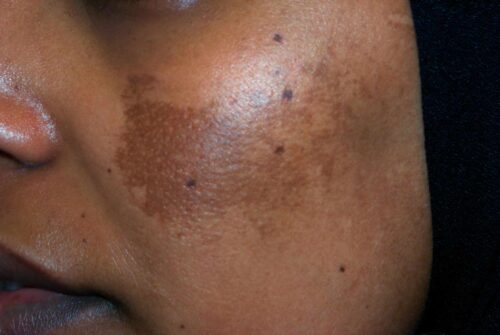Vitiligo – What is it and is there anything we can do?
VITILIGO is defined as the condition wherein the body has a lack of pigmentation from melanocyte destruction, went a bit deep on the scientific wordings right? It’s basically a chronic condition that causes some areas of the skin to lose their natural color. Most medical practitioners would refer to it as skin depigmentation. _Vitiligo _is also derived from the Greek term for “calf” and is used to describe patches of light skin.
Vitiligo, as mentioned by Goodman, 2007 can be hereditary or can be caused by hyperthyroidism, stomach cancer, pernicious anemia, diabetes mellitus, or any autoimmune disease. This is one of the reasons why medical practitioners often refer patients with vitiligo to rheumatologists to rule out any presence of underlying conditions.
As for the presentation of Vitiligo, it may first start appearing as small white spots on the body and is often seen equally distributed around the areas of the body.
These “patches” of white spots may grow overtime. For further information, a study conducted by Naila, 2021 stated that Vitiligo can be classified into three (3), generalized, segmental, and localized. This is depending on the pattern of distribution the condition may present. Though Vitiligo itself is not a great threat to the person’s health, skin depigmentation is often the cause of psychological distress, a source of social stigmatization, and may bring low self-esteem. Vitiligo, being labeled as an autoimmune disease and a cosmetic disease makes it a somewhat complicated condition to address, even today’s modern medicine states that there is no cure for Vitiligo and no there is no way to prevent it.
Now, what can we do if we happen to have this condition?
We have mentioned that there is no cure or any way to prevent it, but what we can do, is we can control the condition by the restoration of skin pigmentation. Depending on the referral of your dermatologist, they might suggest that you would take treatments or skin therapies to restore skin pigmentation such as:
* PHOTOTHERAPY OR LIGHT THERAPY
* SYSTEMIC MEDICATIONS
* CORTICOSTEROID CREAMS
* LASER THERAPY
If you would proceed with the aforementioned treatments, your physician would have to examine you first if you are a suitable candidate since the treatment managements may come with side effects that can cause_ burning, itching, dry skin, swelling, nausea, and can also increase the risk of skin cancer (From a research conducted by Sadia Masood, 2021).
Some people also take alternative supplements to accelerate the body’s restorative function such as Folic Acid, Vitamin C, and Vitamin B12.

Please do talk to your physician first before taking these supplements as this may affect the medications or any procedures you are currently taking.
Interestingly enough, some people that have Vitiligo that covers large regions of skin opt for depigmentation rather than restoration for a much more unified color.
If ever by chance you would like to control the progression of Vitiligo NATURALLY, the prime thing that we have to do is to limit sun exposure. This is for damage control and to protect the integrity of the healthy skin pigmentation.
If you are an outdoor person, do wear sun protective clothing such as long-sleeved shirts with summer hats.
Don’t also forget to put on sunscreen with SPF 35.
Currently, evidence that shows significant roles in preventing Vitiligo through dietary means are weak. However, what you can do is maintain a healthy diet by eating nutrient-filled dishes and drinking lots of water. Since Vitiligo is also labeled as an autoimmune disease, eating healthy can improve your body’s immune system to prevent any other conditions from reoccurring. With the promotion of a proper diet, this also comes with what to avoid.
Avoid or restrict yourself with consuming alcohol, fatty foods, and smoking. For further information regarding this, it is highly suggested that you contact a nutritionist for further guidance.
All in all, Vitiligo is that one condition that cannot be cured, but what we can do is control it.
We can prevent it from worsening or progressing through skin therapies, skin medication, cosmetic concealment, and eating a healthy diet. REMEMBER, if you ever feel down because of your appearance, it is much better to talk about it with your family and friends or go see a doctor that specializes in it so they can be able to find the right treatment for you.
Adjusting is the hardest part, and these people will help you through it.





